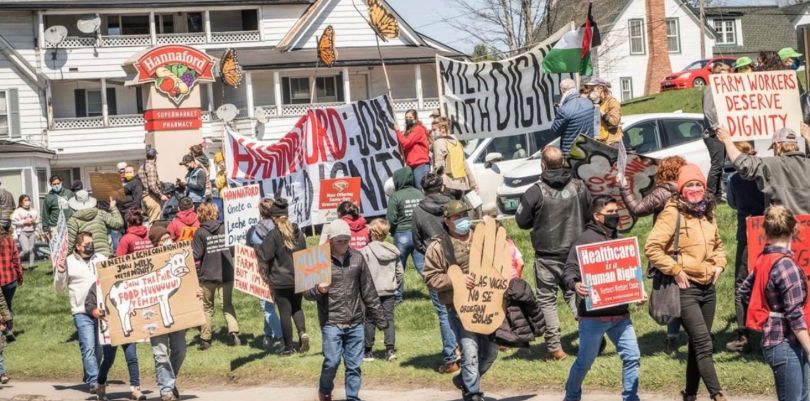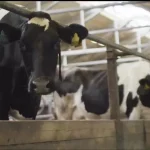
If the supermarket chain becomes a member, farms involved in the production of Hannaford-branded milk will be legally required to follow a set of worker-created standards for improved housing, wages, health and safety conditions.
Milk With Dignity (MWD) was first conceived in 2009 after young dairy worker José Obeth Santiz Cruz was pulled into a mechanized gutter scraper and strangled to death by his own clothing. Three years ago, Ben & Jerry’s signed on to the group’s pilot program. Working and housing conditions for their more than 250 dairy farm workers have improved as a result.
“We are doing the speaking tour to build support and get Hannaford to join Milk With Dignity,” Elizabeth Ramirez, a dairy worker from Vermont, said. “We picked Hannaford as the next company because we know they have close to 200 stores in this region, and they are a large dairy buyer. They’ll have a huge impact to bring the protections to more workers on their farms.”
The workers decided to start their tour in Maine because Hannaford’s headquarters is located in Scarborough, though the chain is now owned by Belgian supermarket firm Delhaize. Additionally, they say that many dairy workers in Maine face adverse labor conditions.
“We’re calling on Hannaford to take responsibility for the conditions on the supply chain. They’re putting their store-brand label on the milk so they have a responsibility to make sure workers behind that milk are protected,” Ramirez said. “We are representing the voice of our community and bringing that voice to Maine.”
MWD has found a strong and diverse network of partners in Maine. They’ve teamed with student, faith and social justice groups statewide to build awareness about the dire conditions on dairy farms.
“We met with a Colby student group, the Oak Institute. We were recently with a community anti-racist group Showing Up for Racial Justice,” Madeline Sharrow, a MWD organizer, said. “[Democratic Socialists of America] is hosting us. A vegetable farm in Freedom, too. In June, we met with a faith organization in Portland and the Maine AFL-CIO. MOFGA [Maine Organic Farmers and Gardeners Association], as well. So it’s been a range of students, faith organizations, community groups, agricultural groups, social justice groups that support us here.”
While touring Maine dairy farms in June, Migrant Justice found dire working and housing conditions, poor safety protocols and unsustainable work hours paid at a rate lower than the minimum wage.
“What we found in Maine was that conditions are substantially the same as Vermont, New York and around the region. All of the conditions that we have been exposing on Vermont farms are present here in Maine, as well,” Will Lambek, an organizer with MWD, said. “We understand the conditions around the region: sub-minimum wage, poor housing, high health and safety risk without sufficient protection, fear of retaliation, long hours without breaks. All those conditions exist in Maine.”
Poor conditions on dairy farms were exacerbated during the pandemic. In many cases, workers were required to continue laboring long hours even while sick with COVID-19. This increased COVID spread among dairy worker communities, creating an unlivable situation for many farm workers.
“Things got worse during the pandemic. You couldn’t travel, leave the state. Farmers were not hiring new people so you were stuck on the farm without an alternative,” Ramirez said. “Workers never got to stay home and quarantine, we kept working. Even when workers got sick, they had to keep working. There was no paid time off and they had to go and work even if they were sick.”
“The fear of retaliation kept workers from reporting symptoms. It’s not only cruel for the person working despite having COVID, but it guarantees community spread. And invariably, other workers on the farm will get sick from that. On many farms there are zero protections at all, the worst possible response to the pandemic,” Lambek added.
“Just last week,” he continued, “we got a call from a worker and his pregnant partner who were run-off the farm when they got the virus. They told the boss they couldn’t go into work and the boss told them, ‘If you don’t want to work, I’ll find someone who does.’ He kicked them off the farm and they had to leave their house the next day while sick with coronavirus.”
Supporters of MWD say the program could help address these types of issues, pointing to a new report from Migrant Justice that shows the initiative is making a difference. Since the inception of the program three years ago, over $1.8 million has been invested back into workers’ rights. The impact includes increased wages, better benefits and improved living conditions.
“The biggest chunk of the $1.8 million is from wages. Outside the program, about half of farms are paying below the minimum wage. Under the program, every farm has to raise the lowest wage to be in compliance with minimum wage based on the state,” Lambek said. “The total impact from the wage raise is close to $1 million.
“But that’s a real undercount,” he added. “When you have to raise the lower wage, all the other wages have to go up as well. So the total impact of wage raises is likely much higher than that.”
“There is a ripple effect too,” Lambek continued. “Twenty percent of Vermont’s dairy industry are now giving raises. So farms outside the program need to raise wages, as well, to attract workers.”
If Hannaford joins the MWD program, dairy workers in Maine will also be able to receive these benefits.
“We want to expand the program to more farms and more states, and that’s why we’re in Maine,” Rameriz said. “But not just in Maine. We want the program, rights and protections to be given to all farmworkers.”

























